Rehabs in Johnson
Johnson is a small county located in central Georgia. With a population of 9,717, it tends to be a conservative place where most families have their own homes.
Its seat is the town of Wrightsville, which has only 867 households. In general, the median income for a family in the area is $42,421 a year. Unfortunately, 25.9% of the population lives in poverty. Luckily, the unemployment rate here is only 2.90%. It is considerably lower than the average U.S. rate.
Although it is a calm rural area, the locals experience problems with alcohol and drugs. Sometimes it grows into an addiction that needs to be dealt with by medical assistance.
Anyway, a person who feels that he/she needs help has to search for relevant facilities. There are not many rehabs in Johnson County, but you can find services that fit your needs. This article will discover the ways of getting professional assistance to fully return to sobriety.
Overdose Epidemic
The healthcare system of the United States has been struggling with the opioid epidemic for years. The data shows that in 2020, 67% of drug overdose deaths were related to opioids.
Moreover, the situation deteriorated because of the pandemic. Consequently, the locals faced the loss of jobs and the growing unemployment rate. This resulted in a 55.9% increase from 2019 to 2021.
The main substances abused in the state are:
Fentanyl
Heroin
Opioids
The authorities are doing everything to stop this. In 2022, Georgia joined the settlement agreement with pharmaceutical distributors. Thus, the state would receive $636 million for prevention efforts.
Substance Abuse Evaluation
Once you feel that you are ready to overcome chemical dependence, you have to pass an assessment. The certified medical staff will examine you to learn more about your disease.
The first step is an interview. It is very important to be sincere and to unveil the history of your addiction. The counselor would ask to complete a questionnaire. Equally important is to understand if a person has a mental health disorder. Based on the condition, the doctor determines a diagnosis.
Detox
Once there is a clear diagnosis, the doctor recommends where to start. The first step is usually detoxification. Getting rid of drugs in a day is an impossible task. In addition, this may require the help of medication. Accordingly, you have to search for a clinic offering medical detox.
Whatever facility you choose, you will have to face withdrawal symptoms. Bear in mind that it is very dangerous to cope with this on your own. Therefore, a medical center's supervision would help clean your body of toxins.
Inpatient
Residential clinics offer 24-hour support to those struggling with severe symptoms. Healing at the residential facility will help to stay away from harmful environments.
One of the rehabilitation centers in the area is Angels in Flight Recovery Center. It offers programs for individuals with substance abuse and mental health disorders.
The clinic is focused on:
Education about addictions
Relapse prevention
Emotional management
Life skills
The services also include toxicology screening, employment, and recovery coaching sessions.
Outpatient
An outpatient program is for patients with milder symptoms who want to stay close to their families. They attend several sessions a week. This enables them to continue their daily life. Anyway, these services are as efficient as inpatient treatment. However, an individual has to attend sessions based on a tight schedule. If he does not take this seriously, he may face a relapse.
The locals can apply to nearby facilities unless they find these services in the Johnson County rehabs. For example, there are options in Milledgeville or in East Dublin. Both are located less than an hour’s drive away.
Addiction Treatment Costs
The price and way of payment are the number one issues for most patients. All clinics have different rules. Some of them are open to accepting Medicaid or Medicare state insurance. As for private insurance, it can cover some part of the treatment. It usually depends on the policy.
Many clinics offer a sliding scale for those who do not have insurance coverage. Finally, you can apply for a loan or raise funds through crowdfunding.

